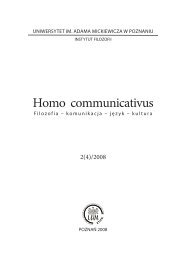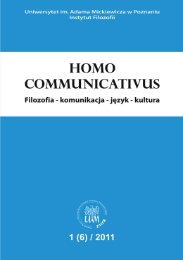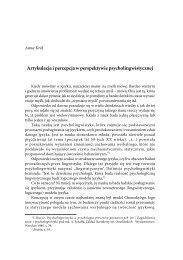Playing by the book literature and board games at the beginning of ...
Playing by the book literature and board games at the beginning of ...
Playing by the book literature and board games at the beginning of ...
Create successful ePaper yourself
Turn your PDF publications into a flip-book with our unique Google optimized e-Paper software.
130 Br i t t a St ö c k m a n n , Je n s Ja h n k e<br />
original <strong>the</strong>mes appear, but during <strong>the</strong> last few years, a rel<strong>at</strong>ively large number<br />
<strong>of</strong> <strong>liter<strong>at</strong>ure</strong>-based <strong>board</strong> <strong>games</strong> have entered <strong>the</strong> market, among <strong>the</strong>m quite<br />
a few <strong>games</strong> for children based on children’s <strong>liter<strong>at</strong>ure</strong> classics <strong>and</strong> popular titles<br />
or series. The most out-st<strong>and</strong>ing game designer in this area is Kai Haferkamp<br />
with his adapt<strong>at</strong>ions <strong>of</strong> popular German children’s <strong>book</strong>s like Das kleine Gespenst<br />
(The Little Ghost), Die kleine Hexe 7 (The Little Witch), Jim Knopf <strong>and</strong> Das Sams<br />
among o<strong>the</strong>rs, as well as a version <strong>of</strong> <strong>the</strong> French Le Petit Prince. All <strong>of</strong> <strong>the</strong>m have<br />
been published <strong>by</strong> KOSMOS. Regarding <strong>the</strong> <strong>liter<strong>at</strong>ure</strong>-based <strong>games</strong> currently on<br />
<strong>of</strong>fer, it becomes obvious th<strong>at</strong> it is this editing house which is specializing in <strong>the</strong><br />
field. Ano<strong>the</strong>r children’s game, Inkheart, this one designed <strong>by</strong> <strong>the</strong> C<strong>at</strong>an inventor<br />
Klaus Teuber, was also edited in 2007 <strong>by</strong> KOSMOS 8 . Wh<strong>at</strong> has been noted in<br />
<strong>the</strong> children’s sector is also true <strong>of</strong> <strong>games</strong> designed for older players – almost all<br />
relevant titles so far have been published <strong>by</strong> KOSMOS. It is not only <strong>the</strong> concentr<strong>at</strong>ion<br />
<strong>of</strong> <strong>liter<strong>at</strong>ure</strong>-based <strong>games</strong> <strong>at</strong> one editing house th<strong>at</strong> is notable, but also <strong>the</strong><br />
recurrence <strong>of</strong> a limited number <strong>of</strong> authors. The game designers most active in<br />
this field apart from Kai Haferkamp are Michael Rieneck <strong>and</strong> Reiner Knizia.<br />
Of <strong>the</strong> first it can be said th<strong>at</strong> almost all his <strong>games</strong> up to now are based on<br />
some form <strong>of</strong> <strong>liter<strong>at</strong>ure</strong>, as <strong>the</strong>re are: Dracula (2003), In 80 Tagen um die Welt<br />
(Around <strong>the</strong> World in 80 Days) (2004), Asterix & Obelix <strong>and</strong> Die Säulen der<br />
Erde (The Pillars <strong>of</strong> <strong>the</strong> Earth) (2006), Nichtlustig (2007). Asterix & Obelix <strong>and</strong><br />
Nichtlustig could be excluded from <strong>the</strong> analysis, as <strong>the</strong>y are based upon comics<br />
<strong>and</strong> cartoons, <strong>and</strong> not upon novels.<br />
In Knizia’s immense ludography, <strong>games</strong> with literary <strong>the</strong>mes form only a small<br />
part; none<strong>the</strong>less he received was given a special award <strong>by</strong> <strong>the</strong> Jury “Game <strong>of</strong> <strong>the</strong><br />
Year” for “Liter<strong>at</strong>ure in Game” in recognition <strong>of</strong> his adapt<strong>at</strong>ion <strong>of</strong> The Lord <strong>of</strong> <strong>the</strong><br />
Rings in 2001, <strong>and</strong> in 2005, he also designed a game version <strong>of</strong> <strong>the</strong> old English<br />
epos Beowulf.<br />
2.1.1. Added <strong>the</strong>me<br />
It is <strong>of</strong>ten a problem th<strong>at</strong> players are lured to buy a certain game, because <strong>the</strong><br />
<strong>the</strong>me appeals to <strong>the</strong>m, but after playing <strong>the</strong> first round <strong>the</strong>y discover with disappointment,<br />
th<strong>at</strong> <strong>the</strong> <strong>the</strong>me has only been pasted onto a certain mechanism, which<br />
has no real connection to <strong>the</strong> game’s title 9 . In this case <strong>the</strong> mechanism, which<br />
might be a very good one, is invented first, <strong>and</strong> only l<strong>at</strong>er <strong>the</strong> author looks for<br />
a <strong>the</strong>me th<strong>at</strong> ei<strong>the</strong>r is fitting or helps to sell <strong>the</strong> game. Larry Levy exposes Reiner<br />
7<br />
Both written <strong>by</strong> Otfried Preußler. Das kleine Gespenst won <strong>the</strong> Award „Children’s’ Game <strong>of</strong> <strong>the</strong> Year” in<br />
2005.<br />
8<br />
On <strong>the</strong> website, KOSMOS even <strong>of</strong>fers a special search c<strong>at</strong>egory called “<strong>liter<strong>at</strong>ure</strong> <strong>games</strong>” as well among<br />
<strong>the</strong> keyword “children’s <strong>games</strong>” as also under <strong>the</strong> general heading “<strong>games</strong>”.<br />
9<br />
See also: L. Levy, When Good Games Have Bad Themes, 2000, , July 2007.
















